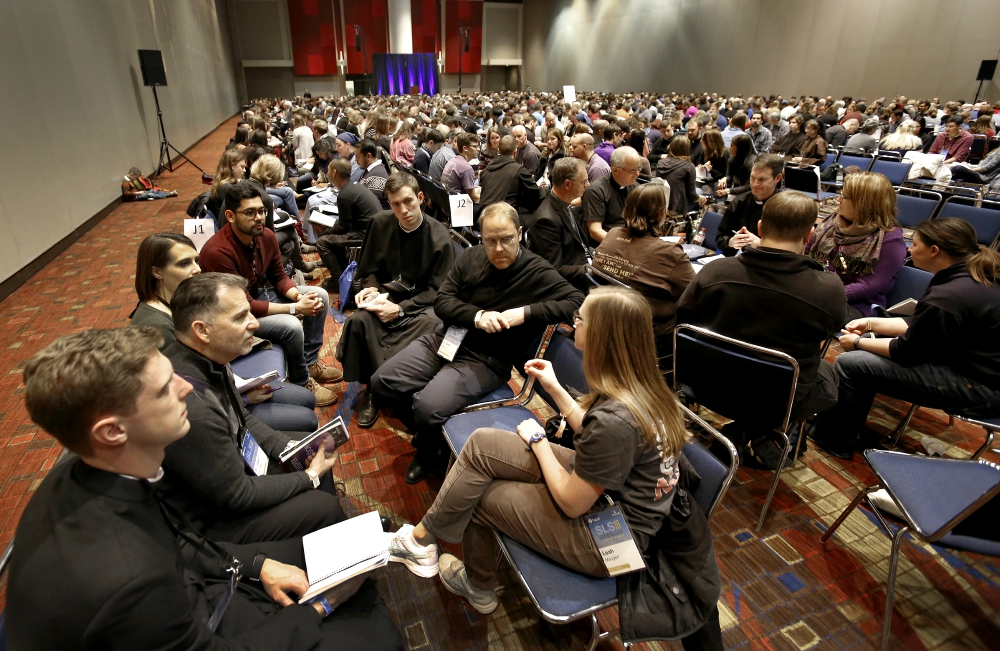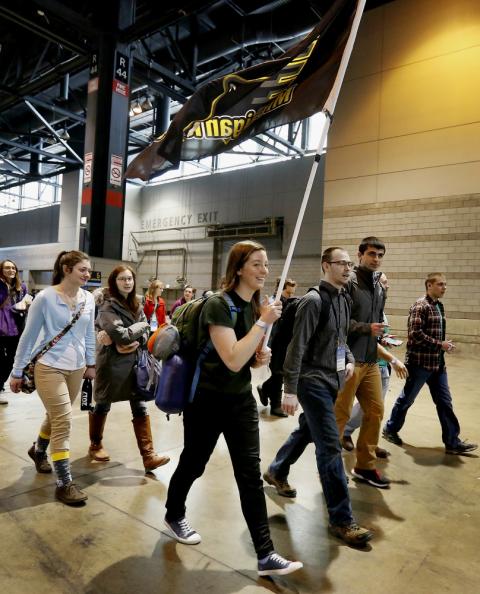
Hundreds of campus ministers gather for a session of FOCUS' 2018 Student Leadership Summit Jan. 3 in Chicago. (CNS/Chicago Catholic/Karen Callaway)
About a thousand young Catholics, all alumni of FOCUS programs, get out of their seats and erupt into conversation and laughter in the middle of a presentation at the Fellowship of Catholic University Students' annual conference. You could call it chaos, but John Zimmer calls it "spiritual multiplication."
The exercise began with Zimmer tapping three volunteers on the shoulder, then sending them out into the audience to each do the same to three other people. Those audience members likewise were instructed to tap three more people, and so on. Within minutes, everyone has been tapped, modeling "spiritual multiplication," the phrase FOCUS uses to describe a pyramidal model of the "new evangelization."
The idea is to be not just "faithful, but fruitful," said Zimmer, vice president of apostolic development for FOCUS, the Colorado-based national college outreach program that has grown to exert substantial influence in the U.S. Catholic Church.
But these young Catholics, who are attending the "lifelong mission track" at the Student Leadership Summit in Chicago in January, already know about spiritual multiplication. As former FOCUS employees (called "missionaries") or as students involved with the organization on their college campuses, they were taught its "Win, build, send" formula.
"Win" means to build "authentic friendships" with people, with the ultimate purpose of evangelization, while "build" requires helping those friends grow in faith and virtue through what FOCUS calls "the big three" virtues: chastity, sobriety and excellence.
"Send" is what Zimmer was trying to illustrate with his exercise: the need to spread the Gospel to others — who can then also spread it, and so on — whether by starting a Bible study on campus or witnessing with a Christian life in the workplace. This "spiritual multiplication," FOCUS teaches, is required by Jesus.
"It's not enough to share the good news. Those who have heard the gospel must learn to teach it to others," said the 2016 publication "How FOCUS Works" for universities considering hiring missionaries on their campuses. "Teaching others how to teach is a bedrock principle of FOCUS missionary work; therefore, those whom the missionaries win and build must be 'sent' to share the life they have in Christ with others."
Although spiritual multiplication refers to "discipling" individuals, it also could describe how the organization itself has grown over the past 20 years, from a handful of missionaries doing outreach at one school to nearly 700 on 137 campuses today.
Zimmer, who has been with FOCUS almost since the beginning and thus is familiar with — and perhaps partly responsible for — its sizeable expansion, also has the responsibility for charting future growth.
The plan is to nearly double the number of college and university campuses where FOCUS sends missionaries in the next five years, to 250 schools, Zimmer told NCR. Such growth seems plausible, given FOCUS' substantial financial resources, with last year's budget of $57 million nearly double its budget from five years ago.
In his Student Leadership Summit presentation, Zimmer explained why "discipling" is the most effective way to reach the world. Not only is it what Jesus did ("He invested in 12 men"), but anyone can do it, he said. And because it is a "person-centered approach," it provides "maximum impact," he said.
Last year, FOCUS hired 200 new missionaries and now has more than 1,000 former missionaries who have worked at least two years for the organization. If Zimmer's five-year growth predictions are accurate, more than 75,000 alumni (former missionaries and participants) will soon transition into the 17,000 parishes in the United States, not only as people in the pews, but leaders and perhaps employees.
But some parishes are already employing FOCUS missionaries, as part of a new pilot program that tries to implement "Win, build, send" in parishes, similar to the organization's current model on college campuses.
The program was launched two years ago in four parishes: in Tulsa, Oklahoma; Charlotte, North Carolina; Orange, California; and a Chicago suburb. Expansion to 25 parishes in the next five years is planned in what appears to be FOCUS' next frontier.
"The new evangelization is not just on college campuses," Zimmer told NCR. "It's in parishes, in neighborhoods, in workplaces. For the new evangelization to really take root, we need parishes to be able to thrive. Some are great, but some are struggling."
Lifelong mission in parishes
One area where many U.S. parishes are struggling is in attracting younger adults to Mass. That was true at St. James, a large parish in the northwest Chicago suburb of Arlington Heights. So the pastor, Fr. Matt Foley, agreed to be part of the pilot program that places pairs of FOCUS missionaries in parishes.
Matt Marcheschi, who was hired with a female counterpart, Erin Corbett, started by hosting a young married couples group with his wife, but the ministry quickly broadened beyond the young adult demographic. This Lent, the two missionaries are coordinating 16 Bible study groups of eight to 10 parishioners each.
"We're here to bring a vision for discipleship and spiritual multiplication to the parish, not specifically to any age group," said Marcheschi, who has worked for FOCUS for 14 years, first as a campus missionary, then in regional leadership and now in parish outreach.
A Facebook post shows parishioners of St. James in Arlington Heights, Illinois, at the Student Leadership Summit sponsored by FOCUS in January in Chicago.
Although there have been challenges adapting the FOCUS model to parishes, Marcheschi already sees fruit from his work. "I've noticed a deep hunger and need for parishioners to go deeper, to know how to share their faith and to have people accompany them in their faith journey to Christ," he said.
And the "Win, build, send" formula works just as well with adults as it does for college students, Marcheschi said. "The call is the same, the need is the same, and the practical steps are the same," he said.
Outreach at a parish, however, differs from campus ministry because it is intergenerational and must adapt to the lives of working people who are often raising children. Marcheschi has had to be creative, noting that a weekly Bible study — the common format on college campuses — doesn't always work in a parish.
"However, I think the desire and the hunger to want to know how to share your faith transcends all that," he said.
Parish missionaries also fundraise their salaries, similar to on-campus missionaries who must raise $3,260, although parish-based missionaries typically raise more because they are older, more experienced and may be supporting a family, said FOCUS spokesperson Leslie Prevish.
But unlike campus missionaries—which cost a school $15,000 per person—the annual fee for parish missionaries is double that, $32,000, or $64,000 for the pair of missionaries hired together. Again, the higher numbers are due to those missionaries’ years of experience, Prevish said.
Marcheschi and Corbett are taking on baptismal preparation at the parish, and a new youth minister is a FOCUS alumna, Marcheschi said. Another FOCUS alum, already a parishioner, is leading a Bible study group.
That kind of parish involvement — what FOCUS calls "lifelong mission" — is exactly what the organization tries to prepare college graduates for once they become spouses, parents and professionals. "Once they leave the college campus is really when it begins," Marcheschi said. "Living out [mission] in everyday life is why parishes exist."

Fr. Bobby Krueger, pastor at St. Leonard Parish in Berwyn, Illinois, visits with young people Jan. 3 during a conference sponsored by the Fellowship of Catholic University Students in Chicago. (CNS/Chicago Catholic/Karen Callaway)
Expansion concerns
But those who criticize FOCUS for placing inexperienced or undereducated ministers in campus ministry positions are equally concerned when FOCUS missionaries serve in parish ministries. Most missionaries, like Marcheschi, have only bachelor's degrees, since they serve immediately after graduating from college, and their degrees may not be in theology or a related pastoral field.
The more than 50,000 professional lay ecclesial ministers employed by parishes in the United States, on the other hand, are usually better trained, according to a 2015 study by the Center for Applied Research in the Apostolate (CARA).
About half of lay ecclesial ministers have graduate degrees, while others may have certificates from the country's nearly 200 lay ministry formation programs, which are sponsored either by dioceses or by Catholic colleges or universities, or by both, according to the CARA study.
Marti Jewell, who led a six-year national research project on parish leadership for the National Association for Lay Ministry, praises the energy and zeal of FOCUS missionaries but has some concerns about lack of preparation and oversight.
"I believe it is critical that pastors and campus ministers understand the very real need to hire appropriately educated persons with theology and ministry degrees to work with our young adults, and the potential consequences when they fail to do so," said Jewell, associate professor of pastoral theology at the Neuhoff School of Ministry at the University of Dallas.
Advertisement
A lay ecclesial minister, as defined by the U.S. bishops' 2005 document "Co-Workers in the Vineyard of the Lord," is an appropriately prepared and formed person who is authorized by the hierarchy to serve publicly in a particular area of ministry, in collaboration with bishops, priests and deacons.
Although hired by the pastor, and with the approval of the local bishop, FOCUS missionaries differ from other parish lay ecclesial ministers in that they are employees of FOCUS and report to their FOCUS superiors.
The potential for problems arises — according to some leaders of campus ministry programs that have dropped FOCUS — when missionaries are not adequately trained in pastoral counseling or Scripture to handle the issues college students, or parishioners, face.
"The people of God deserve well-educated and -formed ministers," said Jewell.
But given tight parish budgets, FOCUS appears to offer enthusiastic — and relatively affordable — options for parish outreach and other ministry, as it has on college campuses. And there is plenty of need, especially at inner-city and rural parishes that suffer most from lack of resources.
However, FOCUS' parish program, at least in its pilot phase, is being tested in large urban or suburban parishes — in one case at the diocesan cathedral in Orange, California — that already have multiple, successful ministries.

Students from Michigan Tech University in Houghton carry the school's flag after the closing Mass Jan. 6 at a conference sponsored by the FOCUS in Chicago. (CNS/Chicago Catholic/Karen Callaway)
Likewise, FOCUS' current list of college campus sites is dominated by large state schools, many of which already have Newman Centers. (FOCUS is also expanding internationally, to Austria, England and Ireland.) But, according to a 2017 study of campus ministry by the U.S. bishops' Secretariat of Catholic Education, three out of four traditional four-year colleges or universities in the U.S. have no Catholic campus ministry, and only one in 44 community colleges do.
Perhaps FOCUS will eventually move into those venues as well, since it quotes Matthew 28 to "make disciples of all nations" in its "bottom line" statement of purpose. And as one FOCUS leader pointed out, its mission statement actually says nothing about college campuses, but rather only to fulfill the "great commission."
FOCUS started on college campuses because of the substantial need and equally substantial opportunity there, said Hilary Draftz, FOCUS' West Area director. "Nowhere are people more networked ... so you have the potential to affect so many people and magnify the impact," she said.
But FOCUS is not just a campus ministry organization, she said, comparing its strategy to that of business tycoon Elon Musk, who once explained that he doesn't run a car company, but rather a battery company — a battery that just happens to be tested first in a car, but eventually could power the world.
In this analogy, spiritual multiplication is the battery, and campus ministries are the cars. "That's where we're testing it out," said Draftz. "The college campus is not the only place where that's needed or could work."
Those college students already reached by FOCUS will over the years become parents, teachers, lawyers, priests and bishops. In fact, the organization already boasts that nearly 700 FOCUS alumni have decided to pursue a vocation to priesthood or religious life, and one-quarter of religious women under the age of 40 have been involved with FOCUS.
"We believe that if they make a Christ-shaped impact on the world, that's how we will be able to fulfill that great commission," Draftz said. "We desire each and every man, woman and child on the face of the planet to have the opportunity to say yes to Jesus and be with him forever in heaven."
[Heidi Schlumpf is NCR national correspondent. Her email address is hschlumpf@ncronline.org. Follow her on Twitter @HeidiSchlumpf.]







